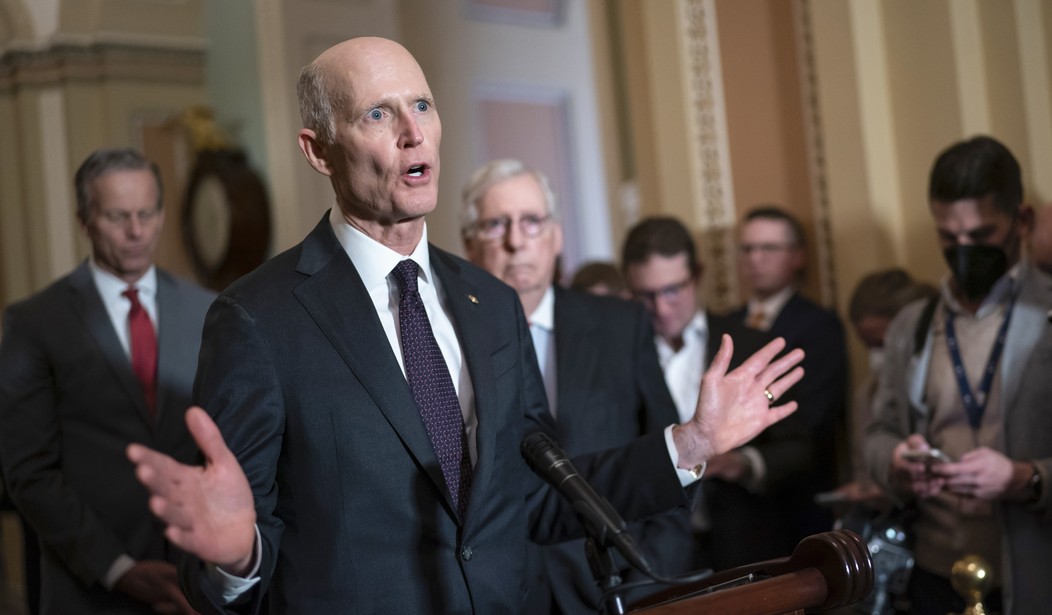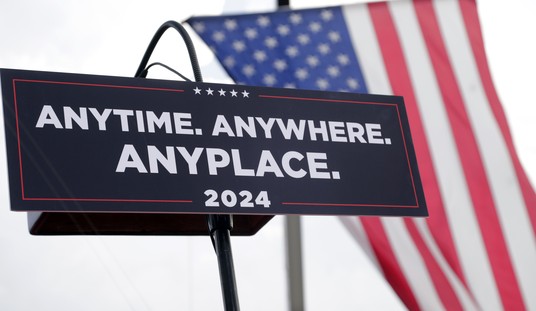There are interviews that tick a box, and there are interviews that are not to be missed. The interview delivered by Rick Scott, Florida’s junior senator and Mitch McConnell’s persistent huckleberry, during Thursday’s Hugh Hewitt Show, belongs, indelibly, in the latter category.
The news peg from which this indispensable interval hung was reporting from the New York Times about the future of the U.S. debt, projected by the Congressional Budget Office to rise by $19 trillion, or 61%, reaching $50 trillion — that’s fifty freaking trillion — by 2034. Good news for fiscal masochists: That’s three trillion more than previously estimated.
Why do these forecast never project shrinkage? Because, among other things, 99 other Senators are not Rick Scott.
Lots of politicians yammer endlessly about reining in the national debt, and both sides of the aisle boast no shortage of balanced budget advocates. What separates them more surely than the Colorado River defines the rims of the Grand Canyon is methodology. One would cut spending (whatever that means). The other would cause the rich (whatever that means) to pay their fair share (whatever that means).
Only Scott has had the gumption to lay out a plan that, if adopted as originated, would force all of Washington to confront its addiction to deficit spending. At the heart of Scott’s project: Every federal program would live on a five-year tether and sunset — that is, end — if not renewed by Congress and the president.
Not unexpectedly, Scott has garnered scant praise for revealing the lone titanium spine within the Beltway. Never mind that President Biden distributed copies of Scott’s Rescue America plan in Tampa to lay out the evils of Republican machinations. You would expect such shenanigans.
But even his closest brethren have fled for the mountains like flat-landers ahead of the Doomsday Comet, fearing the public’s outrage if senior citizen entitlements to Social Security and Medicare were, even symbolically, subject to the Rescue America chopping block.
Scott, at last, conceded much of this in principle Thursday, declining to push back when Hewitt described as “sacrosanct” defense spending and support for senior entitlements. Making it official Friday, he amended (possibly over-amended) his plan to accommodate the Hewitt Rule:
“All federal legislation sunsets in 5 years, with specific exceptions of Social Security, Medicare, national security, veterans benefits, and other essential services.”
Scott would have done better service to his bold, necessary proposal if he’d inserted a period at any point before “other essential services.” No one ever honestly thought Social Security or Medicare would have gone down in a sunset vote — honestly being the operative word here.
Nonetheless, the very notion of putting those programs, around which every living American has made golden-years plans, periodically on the block would have forced federal lawmakers to concentrate on what truly matters in the life of the nation.
Save Social Security and Medicare? Absolutely. No question. But at what cost? That’s a hard conversation in a 50-50 country, one the nation’s leaders have been dodging at least since the creation of Lyndon Johnson’s Great Society legislation.
Under Hewitt’s lively questioning, Scott nipped at the solutions without ever mentioning Rescue America. (Incidentally, if we were Hugh, we’d be annoyed his prominent regular guest passed up the opportunity to make news on his program.)
“We’ve got to start doing what I did in Florida,” Scott said. “You’ve got to start looking at a budget, look at every line in the budget, and pick the things that are most important. … That’s what everyone does, but your government has not been doing that.”
Scott ticked the big-spending programs passed, sometimes with bipartisan support, during the Biden presidency that will push annual federal outlays above $6 trillion, from just over $4 trillion two years ago. “This has got to end,” Scott said. “If you care about our military, if you care about any of our safety net, you have to balance the budget.”
Scott warned, too, about the viability of sustaining debt payments. At some point, he said, “bond-holders are going to say, ‘I’m not going to buy American treasuries. I don’t trust that they’ll pay the interest expense. … Look what the taxes would have to go up to to pay for this.”
Until Friday, when Scott blinked, the senator’s proposals matched his rhetoric. That’s what made those 11 1/2 minutes with Hewitt must-listen radio. It remains important, because we can be confident, before its latest amendment, Rescue America was Scott at his most honest.
It was that sort of candor that won the admiration of the admirable Club for Growth, which announced its support for his 2024 re-election Wednesday.
“While other Republicans have caved to massive tax-and-spend packages that have strained our economy, Rick Scott has consistently championed small government solutions centered around fiscal responsibility, and because of that he’s faced the unfounded and false attacks of liberal Democrats like President Biden and even establishment Republicans like Leader McConnell,” David McIntosh, president of the Club for Growth, said to POLITICO.
Even as Leader McConnell sniffed at Scott’s prospects in the senior-laden Sunshine State, it was hard not to like his chances of winning over skeptics, given an opportunity to campaign on the benefits of applying the strictures of Rescue America as a guarantee that would focus Congress’ attention on what is necessary, prudent, and proper.
By conceding a revision that includes an epic loophole — “essential services” — Scott has — for the moment — caved to the notion that politics is the art of the possible.
OK. Re-election first. Rescue America, *sigh*, down the road.







